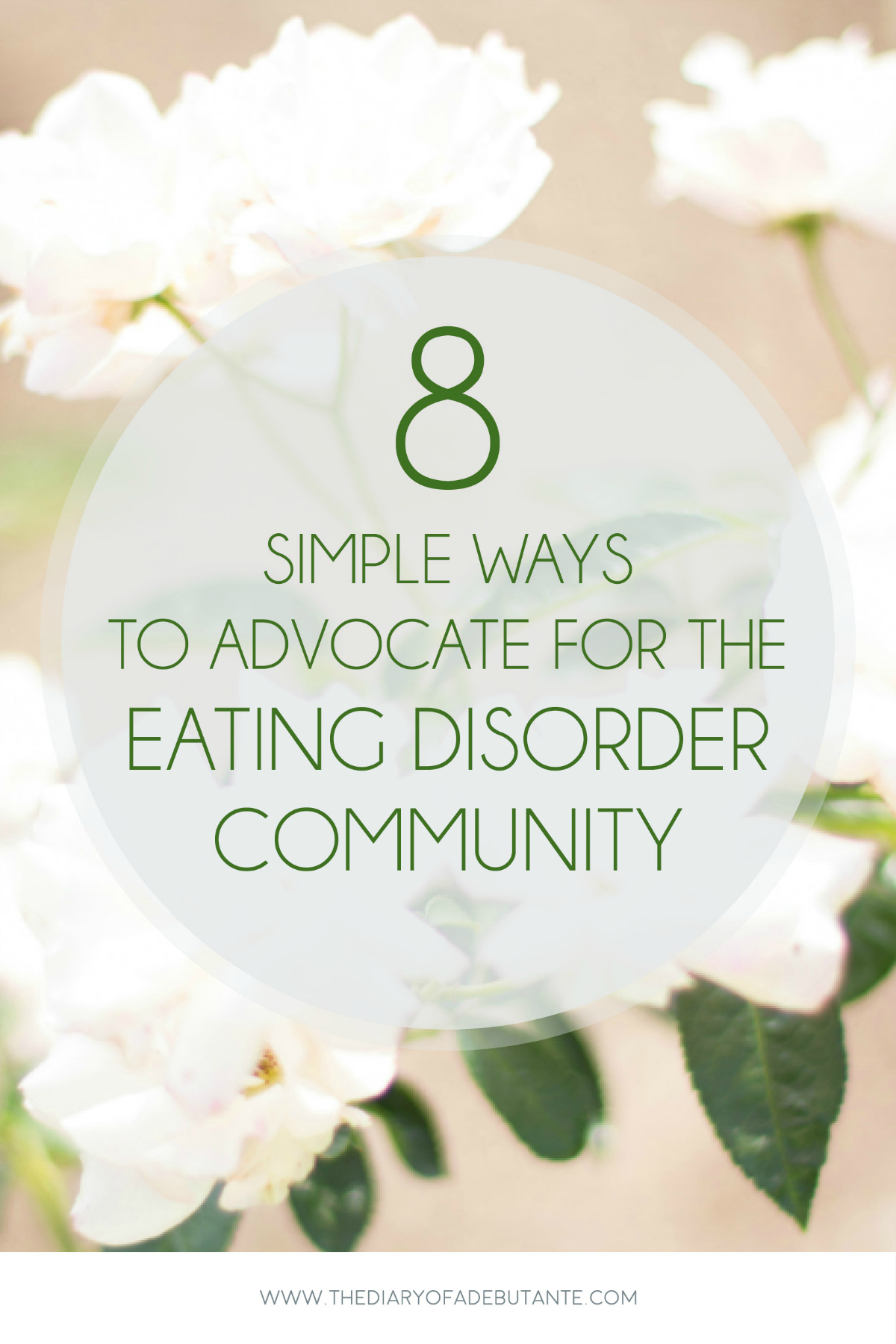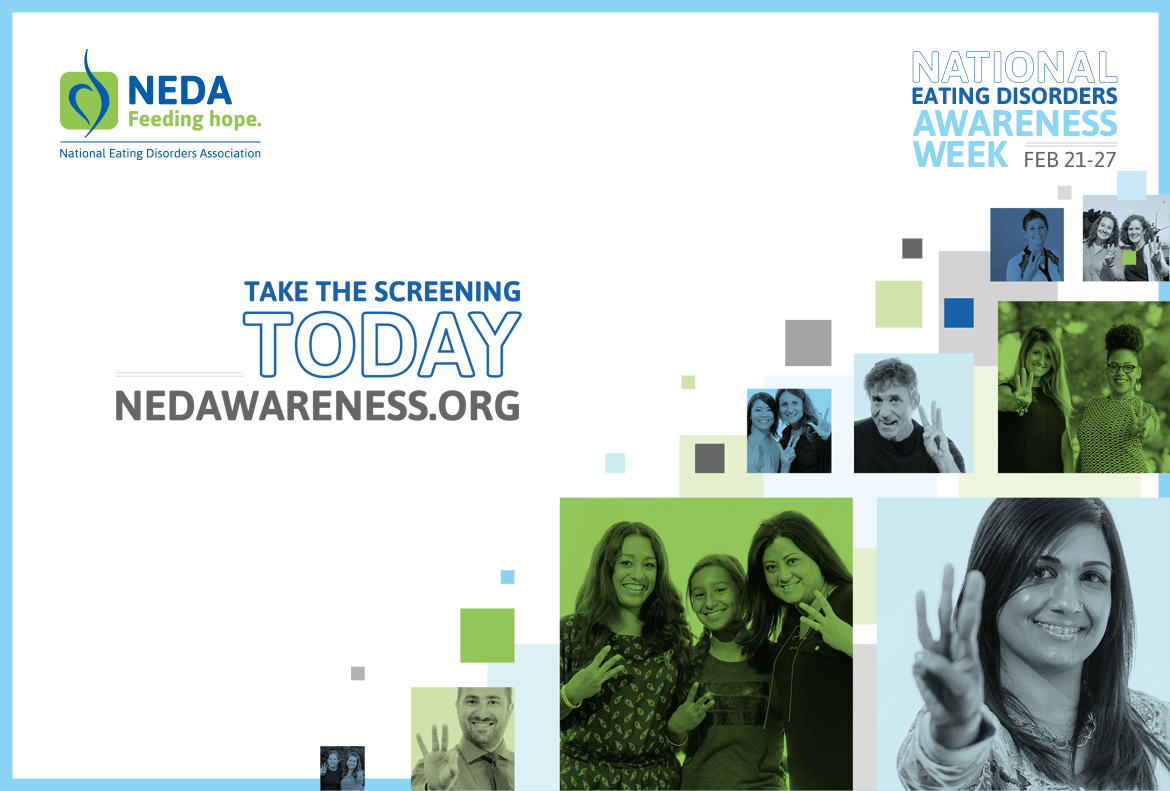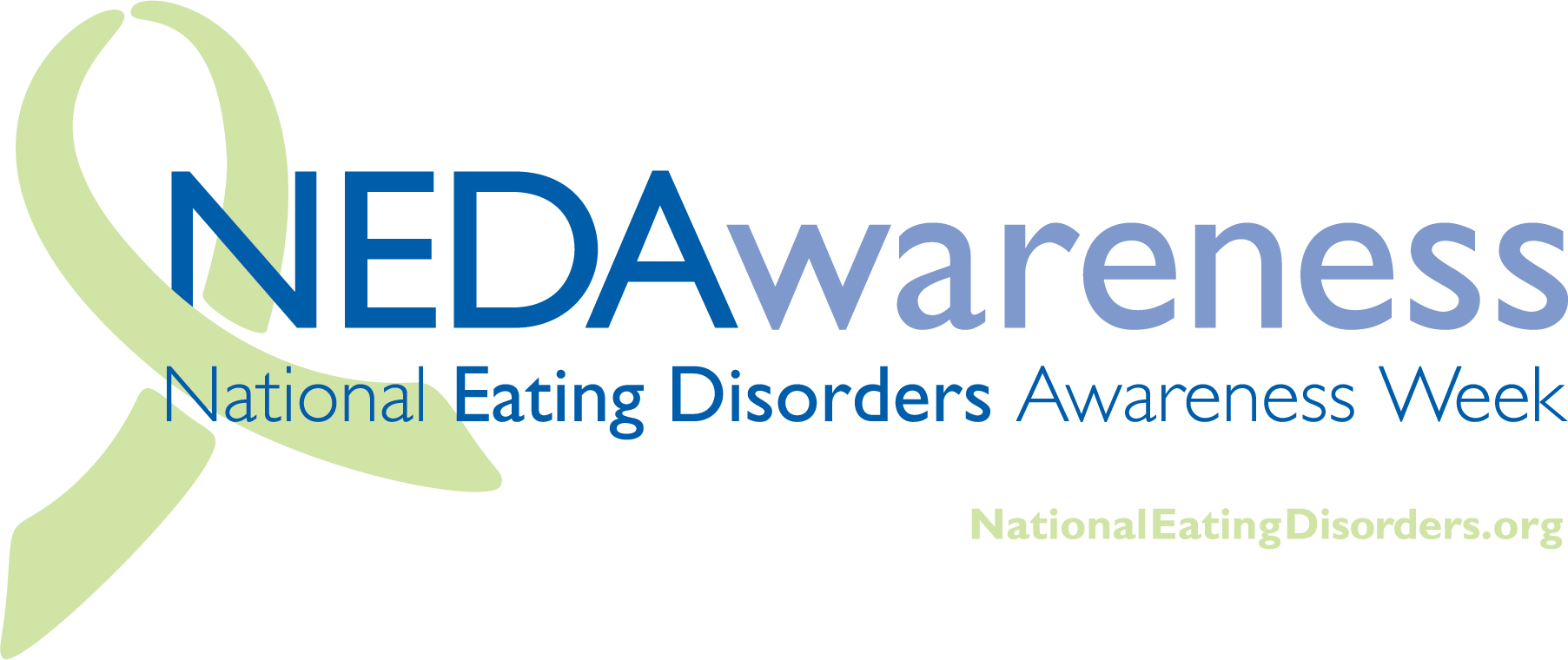*This post may contain affiliate links, which means I may receive a commission (at no additional cost to you!) if you make a purchase using any of these links.*
You don’t need to live in Washington, graduate from law school, or have a degree in counseling to be an advocate for a cause that’s dear to your heart. For me, that cause is eating disorder awareness. 30 million Americans will struggle with an eating disorder at some point in their lives. Anorexia is the 3rd most common chronic illness among adolescents and has the highest mortality rate of any mental illness. Although fundraising for research and public program initiatives is always helpful, there are plenty of ways to rally for eating disorder awareness which don’t involve writing a check or running a 5K. Every one of us can be an advocate for eating disorder awareness by taking steps to educate ourselves, challenging societal standards, and spreading the word about the dangers of eating disorders. Here are some ideas for how you and your friends can join the fight against eating disorders:
Write to Your Representatives
Congresswomen Renee Ellmers, Yvette Clarke, Kathy Castor, Ileana Ros-Lehtinen, and Nita Lowey introduced H.R. 4153, also known as the Educating to Prevent Eating Disorders Act of 2015, which is legislation aimed at creating a pilot program for eating disorder screenings and seminars in schools across the country. The Educating to Prevent Eating Disorders Act of 2015 strives to amend the Public Health Service Act in order to establish a preliminary program to show the importance of education and early intervention (ie. the best prevention) for eating disorders. The earlier students, parents, and teachers are aware of the signs, symptoms, and triggers of eating disorders, the earlier prevention and/or intervention can take place.
Here’s a helpful, sample thank you letter, provided by the NEDA (National Eating Disorders Association):
I am writing as a constituent to thank you for your leadership and support of H.R. 4153, the Educating to Prevent Eating Disorders Act of 2015. Your support of this important initiative means a lot to me! H.R. 4153 could be the most important proactive piece of legislation for the early intervention and the prevention of eating disorders. Once an eating disorder takes hold, it is very difficult to reverse; the physical, emotional and financial toll it takes on families can be devastating. Your leadership in introducing H.R. 4153 is an important step to improve the health and well-being of your constituents, and I am so grateful for your attention to this issue.
If none of these women represent your area, write to your US Representative(s) asking them support early intervention for eating disorders! Here’s a sample request for the support of H.R. 4153, also from the wonderful people of the NEDA:
I am writing to ask you to support and sign on as a co-sponsor of H.R. 4153, the Educating to Prevent Eating Disorders Act of 2015. This bill aims to establish a pilot program to test the impact of early intervention through screenings on the prevention, management, and course of eating disorders. H.R. 4153 could be the most important proactive piece of legislation for the early intervention and the prevention of deadly eating disorders. Thirty million Americans will struggle with an eating disorder at some point in their lives. Anorexia is the third most common chronic illness among adolescents and has the highest death rate of any mental illness. Eating disorders, including Anorexia Nervosa, Bulimia Nervosa, and Binge Eating Disorder, impact every organ system in the body; early recognition may prevent the development of eating disorders and subsequent chronic health conditions.
The intention of H.R. 4153 is to detect risk factors and symptoms so that young people can be directed to help when it is most effective. Once an eating disorder takes hold, it is very difficult to reverse; the physical, emotional and financial toll it takes on families can be devastating. You can lead the way by supporting this important initiative to improve the health and well-being of your constituents.
You can write to your U.S. Representatives on your own or submit a convenient contact request via the NEDA website, where they’ll automatically direct your message to the appropriate person according to your location.
Connect with Peers
You never know who’s looking up to you, so set a model example of positive self-esteem and a healthy body image. Recognize that others pay attention and learn from the way you talk about yourself– particularly your body, and shift your language to reflect self respect and appreciation. Choose to value yourself based on your goals, accomplishments, talents, and character– not the superficiality of your physical beauty, and celebrate your body’s unique shape and size at every possible opportunity.
If you ever need inspiration or motivation, seek support from fellow recovery warriors who have reached out for help and taken control of their mental health. Tap into the treasure trove of powerful resources available on the internet, like these uplifting video testimonials from Half of Us. If you’re on Twitter, I’ve created a list of all my favorite eating disorder support groups here, so follow along for daily motivation and encouragement. Remember that you’re never alone.
Offer to Help
If you think someone has an eating disorder, express your concerns in a direct, caring manner. Firmly, but never aggressively, encourage the person to seek trained professional help, and use any of the following tools as a reference to communicating effectively and respectfully or click/share the image below to begin a completely free, confidential online screening:
Here is a guide to finding and funding eating disorder treatment | Here is a simple guide to helping someone with an eating disorder from HelpGuide.org | Here is a more detailed toolkit for anyone who wants to understand more about how to support a family member or friend affected by an eating disorder from the NEDA | Here are 14 things to never say to someone in eating disorder recovery | Here is a link to the NEDA’s Parent, Family & Friend network
Be a STAR
Want change? Get your hands dirty by joining a program for state and federal advocacy! The NEDA established the STAR Program to legislatively advocate for awareness, education, early intervention through preventative programs, funding for research, and improved access for the treatment of eating disorders. STAR is driven by passionate volunteers who lobby for change by speaking with legislators and forging alliances with other groups who share the STAR vision. Although it’s always a plus, you don’t need experience to make a difference. Just one spark starts the fire! Contact [email protected] for more information or click here to apply.
For additional volunteering, internship, and employment opportunities, check out any of these national eating disorder organizations:
Pledge Your Support
Promote online health, hope, and healing among eating disorder sufferers by joining the Eating Disorder Hope Pro-Recovery Movement and/or take the pledge to Stamp Out Stigma by recognizing the high prevalence of mental illness and substance use disorders in today’s society. When recognition is coupled with education and understanding, health-seeking action can be taken. These actions lead to recovery, which is possible for everyone.
Call Party Foul on the Media
Become an active, critical viewer of the media and its harmful messages about self-esteem and body image. Call party foul when you hear a comment or see an image or advertisement that promotes an unrealistic physical ideal. Rip out articles in magazines that make you feel bad about your body and write to the editor expressing your disappointment in their irresponsibility. To learn more about effectively combatting the trolls of advertising and entertainment, please visit Tips for Becoming a Critical Viewer of the Media.
Mark Your Calendar
Stay up-to-date with eating disorder initiatives and advocacy groups. For starters, National Eating Disorder Awareness Week is February 21-27, 2016. National Eating Disorders Awareness Week (aka NEDAwareness Week) is an annual campaign to bring public attention to the critical needs of people with eating disorders and their families. The focus of this year’s campaign is on early detection and intervention.
Here is a helpful calendar of 2016 eating disorder events and seminars from the ANAD, and here is another eating disorder events directory from Eating Disorder Hope.
Spread the Concern
Even if you’ve never personally suffered from an eating disorder, speak your mind by posting on the National Eating Disorders Association Facebook page about how early intervention and community support helped you or a loved one. Talk about your journey with your family, friends, followers– whoever. Be boldly proactive about the Educating to Prevent Eating Disorders Act of 2015 on social media; people cannot know how or what to support the act if they don’t know how they can help. Post status updates, tweet your heart out, take photos for Instagram, and share, share, share! If you’re on Twitter, I’ve created a list of all my favorite eating disorder support groups here, so follow along for daily motivation and encouragement.
| Sources: NEDA (National Eating Disorders Association) | ANAD (National Association of Anorexia Nervosa and Associated Disorders) | Proud2Bme | Half of Us |
When I is replaced by We, even illness becomes wellness. Have a great week!






Thank you for this article. Back when I was in middle school, a classmate of mine was bulimic and a girl in the next grade up ended up in the hospital because of her eating disorder. I’ve never forgotten either of them and I hope someday we live in a world where no one ever has to go through it. The steps you’ve outlined are a good start to making that happen.
you have done some other great work and then the info can come in handy
Pingback: Eating Disorders Day of Action - Diary of a Debutante